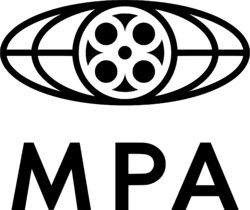Motion Picture Association facts for kids

Logo since 2019
|
|
| Abbreviation | MPA |
|---|---|
| Formation | 1922 |
| Type | Non-profit corporation |
| Legal status | 501(c)(6) |
| Headquarters | Washington, D.C., U.S. |
|
Area served
|
Worldwide |
| Products | Film ratings, lobbying, anti-piracy, self-regulatory |
|
Members
|
|
|
Chairman and CEO
|
Charles Rivkin |
|
Formerly called
|
Motion Picture Producers and Distributors of America (1922-1945) Motion Picture Association of America (1945-2019) |
The Motion Picture Association (MPA) is a group that represents the biggest movie studios in the United States. It also includes the streaming service Netflix.
The MPA started in 1922 as the Motion Picture Producers and Distributors of America (MPPDA). From 1945 to 2019, it was known as the Motion Picture Association of America (MPAA). Its first goal was to help the American film industry stay strong.
The MPA also created rules for what could be shown in movies. This led to the Motion Picture Production Code in 1930. This code was later replaced in 1968 by a system that rates movies. This system helps parents decide if a movie is right for their kids.
Today, the MPA works to protect copyright for movies and TV shows. This means they try to stop people from illegally sharing films online. The current leader of the MPA is Charles Rivkin.
Contents
History
Foundation and Early Days: 1922–1929
The MPA began in 1922 as the Motion Picture Producers and Distributors of America (MPPDA). It was a group for movie companies. When it started, its members made about 70% to 80% of all films in the U.S. Will H. Hays, a former Postmaster General, was its first president.
In its early years, the MPPDA worked to make Hollywood look good. They wanted to make sure movies had a "clean moral tone." This helped Hollywood get money from investors. The group also set rules for how actors should behave off-screen. They also tried to protect American movies in other countries.
Hays spoke out against censorship of movies. Many people didn't like censorship, but they also worried about morals in films. At this time, some states and cities had laws that censored movies. Films were often changed to follow local rules about violence or other topics. This made movies sometimes confusing and less popular.
In 1924, Hays tried to get studios to control themselves. He created "The Formula," which were guidelines for filmmakers. Studios were asked to send movie ideas to the MPPDA for review. But this didn't work well, as studios didn't have to follow his advice.
Later, in 1927, Hays made a list of "Don'ts and Be Carefuls." This list showed what problems movies might face in different places. He also created a department to help studios with scripts. But studios mostly ignored these rules too.
The Production Code: 1930–1934
In 1930, the MPPDA introduced the Hays Code, also called the Motion Picture Production Code. This code had strict moral rules for movies. Unlike earlier rules, studio leaders agreed to follow this code. It included many of the "Don'ts and Be Carefuls."
For example, the code said that "scenes of passion" were only allowed if they were needed for the story. It also banned showing criminals in a good light. Studios were more willing to send their scripts for review.
However, during the Great Depression, studios needed to make movies that would attract many viewers. This sometimes meant breaking the Code to make more exciting films.
In 1933 and 1934, some religious groups planned to boycott movies they thought were immoral. To avoid this, the MPPDA created a new department. It was called the Production Code Administration (PCA). Joseph Breen was put in charge.
The PCA's decisions were final. No movie could be shown in U.S. theaters without the PCA's approval. If a producer showed a film without approval, they faced a large fine. So, starting July 1, 1934, the Production Code was strictly enforced across the country.
War Years and New Leadership: 1934–1963
After the Code was adopted, Breen often sent films back for changes. He sometimes even refused to approve movies. Hays continued to promote wholesome American films around the world.
Studios followed the Code for about three years. But by 1938, with war starting in Europe, studios worried about losing money abroad. They started to follow the Code less strictly. In 1945, Hays left his role as president.
In 1945, Eric Johnston became the new president. He changed the group's name to the Motion Picture Association of America (MPAA). He also created a group to promote American films in other countries.
In 1956, Johnston updated the Production Code. This allowed some topics that were previously forbidden, as long as they were handled "within the limits of good taste." But it also added new rules, like banning blasphemy in films. Johnston was well-liked and helped Hollywood work with the government. He died in 1963.
The Modern Film Rating System: 1966–2004
In 1966, Jack Valenti became the MPAA president. In 1968, Valenti replaced the old Production Code. He created a new system of voluntary film ratings. This system aimed to give parents information about movies. It also allowed filmmakers more freedom.
In 1975, Valenti started an anti-piracy division. This group worked to stop illegal copies of films. Valenti also oversaw a big change to the rating system. The "X" rating was removed and replaced with "NC-17" in 1990.
In 1994, the group changed its international name to the Motion Picture Association. This showed that movies and TV shows were enjoyed all over the world. In 2001, Valenti created a department to deal with digital film and online piracy.
Modern Era: 2004–Present
Valenti stepped down in 2004 after 38 years. Dan Glickman took over. He focused on protecting content and helping U.S. studios reach international markets. Glickman left in 2010.
In 2011, former U.S. Senator Chris Dodd became president. Dodd worked to protect content and improve Hollywood's image. He traveled to China to encourage them to stop piracy and open their film market. This led to an agreement in 2012 that allowed more Hollywood films in China.
In 2011, the MPAA supported laws to stop online piracy. In 2012, the MPAA started a program to increase diversity in the film industry. This program works with many groups to promote different voices and stories.
In 2017, the MPAA helped launch the Alliance for Creativity and Entertainment (ACE). This group works to reduce online piracy. Charles Rivkin became the new CEO in 2017.
In January 2019, Netflix joined the MPAA. This was a big step, as Netflix was the first streaming service to become a member. In September 2019, the group officially changed its name to the Motion Picture Association (MPA). This new name reflects its global work in film, TV, and streaming.
Film Rating System
In 1968, the MPAA created the Classification and Rating Administration (CARA). This group gives ratings to movies shown in the U.S. These ratings help parents decide if a movie is suitable for their children.
The rating system has changed over time. For example, the PG-13 rating was added. The system is voluntary, meaning studios don't have to get a rating. However, many theaters won't show movies without a rating. For instance, theaters usually don't let children under 17 watch R-rated films without an adult. An unrated film is often marked as "NR."
In 2006, a film called This Film Is Not Yet Rated suggested that the MPAA favored its member studios. It also said the rating process wasn't clear. In response, the MPAA put its rules and how it rates films online. The MPA says that independent parents make the ratings.
A 2015 study found that 93% of parents in the U.S. find the rating system helpful.
Here are the ratings used by the MPA's system:
| Rating block/symbol | Meaning | MPA's explanation |
|---|---|---|
| G – General Audiences | "Nothing that would offend parents for viewing by children."
On the box: "All ages admitted" |
|
| PG – Parental Guidance Suggested | "Parents urged to give 'parental guidance.' May contain some material parents might not like for their young children."
On the box: "Some material may not be suitable for children" |
|
| PG-13 – Parents Strongly Cautioned | "Parents are urged to be cautious. Some material may be inappropriate for pre-teenagers."
On the box: "Some material may be inappropriate for children under 13" |
|
| R – Restricted | "Contains some adult material. Parents are urged to learn more about the film before taking their young children with them."
On the box: "Under 17 requires accompanying parent or adult guardian" |
|
| NC-17 – Adults Only | "Clearly adult. Children are not admitted."
On the box: "No One 17 and Under Admitted" |
Members
| Current members | Year of induction |
|---|---|
| Paramount Pictures | 1922 |
| Universal Pictures | 1922 |
| Warner Bros. | 1923 |
| Walt Disney Studios | 1979 |
| Sony Pictures | 1989 |
| Netflix | 2019 |
The first members of the MPAA were major film studios like Paramount Pictures and Universal Pictures. Warner Bros. joined in 1923. Walt Disney Studios joined in 1979, and Sony Pictures in 1989.
Over the years, some studios merged or left the group. In 2019, Netflix became the first streaming service to join the MPA. This helped keep the number of members strong after some studio changes. The MPA hopes to add more members in the future.
Fighting Piracy
The MPA works hard to stop copyright infringement, also known as piracy. This means they try to prevent people from illegally copying and sharing movies and TV shows.
Their efforts began in 1975 with the Film Security Office. This office tried to find and stop unauthorized recordings of films. The MPA has continued to fight illegal distribution as new technologies appear.
In the 1980s, they worried about VCRs and how they might affect the movie industry. Later, they supported laws to stop illegal copying of films online.
The MPA also works with law enforcement to stop illegal sharing of copyrighted materials online. They have supported efforts to shut down websites that illegally share movies.
In 2013, the MPAA helped create the Copyright Alert System. This system worked with internet providers to tell users if their accounts were used for illegal sharing. It offered information on how to get authorized content. This system ended in 2017.
The MPA continues to work with governments around the world to fight piracy. They report websites and services that illegally share content.
International Activities
The MPA works with local law enforcement around the world to fight piracy.
The MPA has offices in different regions:
- Motion Picture Association – Canada
- MPA EMEA (Europe, Middle East and Africa), which has anti-piracy programs in 17 European countries.
- MPA Asia and Pacific, which has anti-piracy programs in 14 Asian countries.
- MPA Latin America, which has anti-piracy programs in two Latin-American countries.
Images for kids
See also
 In Spanish: Motion Picture Association para niños
In Spanish: Motion Picture Association para niños
- Australian Classification Board
- British Board of Film Classification
- DeCSS: decryption program for DVD video discs using Content Scramble System
- Eirin
- Entertainment Software Rating Board
- Will H. Hays
- National Association of Theatre Owners
- Operation Red Card
- Pre-Code
- Pre-Code Hollywood
- United States Motion Picture Production Code of 1930
 | Aurelia Browder |
 | Nannie Helen Burroughs |
 | Michelle Alexander |








